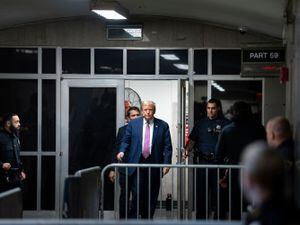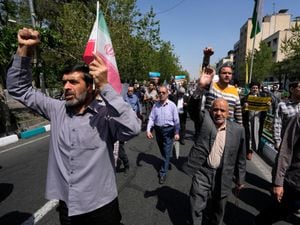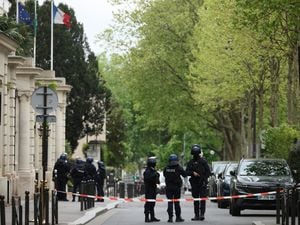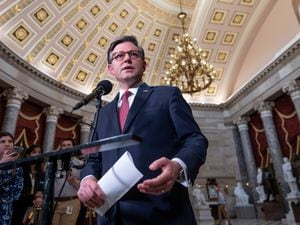What coronavirus restrictions are in place around the world?
Many countries are planning to ease strict lockdown conditions.
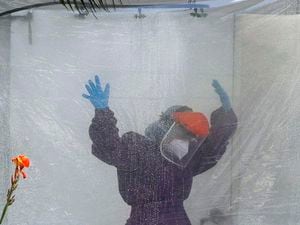
Some countries are now easing strict lockdown conditions as the world continues to tackle the coronavirus pandemic.
The global death toll stands at more than 200,000, with close to three million people having been infected worldwide.
As countries weigh up the risk of a fresh wave of virus cases against the need to kick-start their economies, here is the lockdown status in several nations:
CANADA
Quebec’s premier says primary schools and nurseries outside the greater Montreal area will reopen on May 11 despite the fact his province has the worst outbreak in Canada.

Francois Legault said facilities in greater Montreal will reopen the next week, on May 19. He said attendance will not be mandatory, but he is reopening schools for social and educational reasons.
Mr Legault said high schools, junior colleges and universities will remain closed until September. He is urging those institutions to do as much online teaching as possible.
TURKEY
President Recep Tayyip Erdogan says his government is working on a detailed plan to ease restrictions, but warned that weekend lockdowns are likely to continue until after the end of the holy Muslim month of Ramadan in May.

In a televised address following a weekly cabinet meeting, he said this week’s curfew will start on Friday May 1, which is Labour Day — a public holiday in Turkey.
The vice president will evaluate recommendations from the country’s Covid-19 advisory council to decide “which steps will be taken in which fields and on which date”, Mr Erdogan said.
ROMANIA
Romania’s president says the country’s pre-schools, schools and universities will remain closed until the end of the school year. Distance learning will continue until the mid-June summer break.
Romania’s state of emergency because of the new coronavirus pandemic is currently scheduled to be in place until May 15.
Romania has reported 11,339 coronavirus cases and 631 deaths.
CROATIA
Public transport has resumed in the Croatian capital of Zagreb as authorities launched a phased easing of measures against the new coronavirus.
Loosening of some rules designed to curb the outbreak is accompanied by strict respect of social distancing measures and the use of protective gear and disinfectants.
In previous weeks, public transport lines were restricted.
NORWAY
Norwegian children returned to school on Monday while the country’s health and culture ministers went for haircuts as salons reopened.
Prime Minister Erna Solberg watched students return to classes at the Ellingsrudaasen school in Oslo.
Tattoo parlours and beauty salons through Norway also reopened on Monday.

PORTUGAL
Portugal’s prime minister says authorities are aiming to relax some of the measures devised to stem the spread of the coronavirus next month.
Prime Minister Antonio Costa said new rules on self-isolation and going back to work or school will be introduced every two weeks, as their impact is assessed.
The plan is due to be announced on Thursday.
Mr Costa warned the changes do not mean a return to normal and that will only happen once there is a vaccine.
Portugal was quick to enact a lockdown and has reported 903 deaths from Covid-19, far fewer than neighbouring Spain’s more than 23,500.

ITALY
There were some encouraging signs for Italy as it recorded the lowest 24-hour number of deaths since mid-March, with 260.
Seven weeks into a strict lockdown, Premier Giuseppe Conte has laid out a timetable for getting back to normal.
He announced that factories, construction sites and wholesale supply businesses can resume activity as soon as they put safety measures in place against the virus.
Mr Conte also said that starting from May 4, parks and gardens will reopen, funerals will be allowed, athletes can resume training, and people will be able to visit relatives living in the same region.
If all goes well, stores and museums will reopen on May 18, with restaurants, cafes and salons to follow on June 1.

GREECE
Greece will announce detailed plans to ease coronavirus-related restrictions on Tuesday but authorities have already promised haircuts will be among the first services available.
Hair salons and barbershops will be included in the first stage of reopening businesses when restrictions begin to ease on May 4.
A recent opinion poll found that going to the hairdressers was top of Greeks’ post-lockdown wish list, followed by domestic travel, and buying clothes.
SWITZERLAND
businesses such as hair salons, tattoo parlours, veterinarians’ offices and garden shops are reopening up across Switzerland.
It is part of a multi-tiered reopening as the country gradually eases restrictions.
Requirements from Swiss authorities say businesses must provide individual clients an average of at least 10 square meters in their shops and offices, set up lines outside their buildings and regularly clean their equipment and surfaces.
Service-providers such as barbers and masseurs who come within two meters of customers were advised to wear masks and transparent-plastic face screens, and wash or disinfected hands before and after each client.
Pet-owners were expected to drop off their animals outside the vet offices, only to pick them up after the visits are over.
Schools and a wider array of businesses are to resume operations on May 11, followed by a vastly expanded reopening on June 8.
No date has been set for the resumption of large gatherings such as sporting events and concerts.

DENMARK
Courts of law across Denmark reopened on Monday as the Scandinavian country continued phase one of what it has called a “controlled reopening” of society.
“We are looking forward to coming back to the court rooms but it must be done in a health-responsible way, both for our users and employees,” said Kristian Hertz, head of the Danish Court Administration.
According to the administration’s guidelines, a judge can limit the number of people inside a court room if he or she gauges that there are too many people.
Denmark already has allowed some people back to work, including hairdressers, dentists, tattoo parlours, physiotherapists, among others, and some classes were allowed to return to school.
SPAIN
Children have been allowed to go outside for the first time in six weeks.
Prime Minister Pedro Sanchez is due to present a detailed plan for the “de-escalation” of Spain’s lockdown, but said the scheme would be cautious.
From Friday on, people of all ages will be allowed to go on walks or practise sports outdoors, Mr Sanchez has announced.
UNITED STATES
Governors in states including hard-hit New York and Michigan are keeping stay-at-home restrictions in place until at least mid-May, while their counterparts in places such as Georgia, Oklahoma and Alaska are allowing certain businesses to reopen.
The split in approaches to reopening states has often been along partisan lines.

Oklahoma governor Kevin Stitt, a Republican, told Fox News that with hospital admissions dropping in his state, he will reopen churches and restaurant dining on Friday, with social-distancing guidelines in place.
However, Michigan governor Gretchen Whitmer, a Democrat, told ABC that her state is not ready and needs more robust testing, community tracing and a plan for isolating people who get sick.
NEW ZEALAND
Prime Minister Jacinda Ardern is preparing to ease rules on a strict lockdown put in place to limit the spread of coronavirus.
The country reported five new Covid-19 cases on Monday but has not seen widespread community transmission, and will allow a partial reopening of the economy.
Ms Ardern said the country has so far managed to avoid the worst scenarios for an outbreak, but would continue to hunt down the last few cases.
From midnight on Monday, certain businesses such as construction will be allowed to reopen, but social distancing rules will still apply.
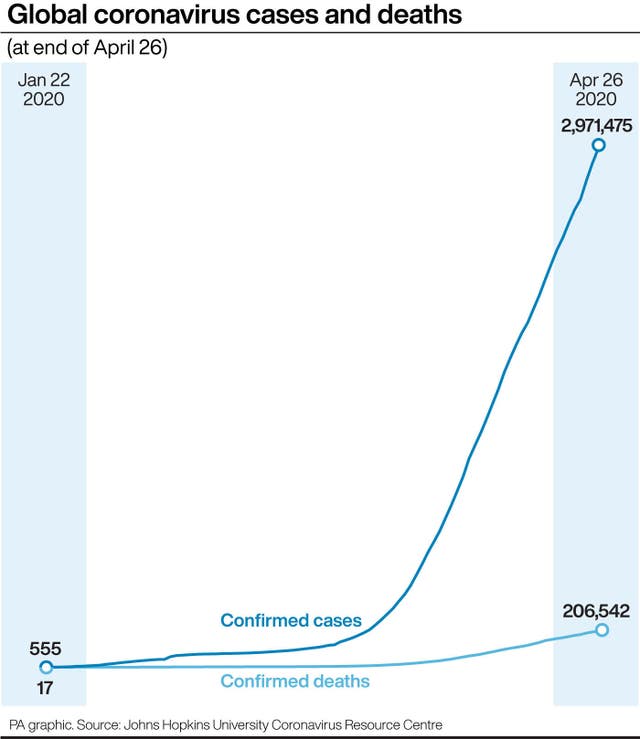
SOUTH KOREA
The government is looking at reopening schools as the number of cases begins to tail off.
Authorities reported 10 new cases on Monday, the 26th straight day where this number has been in double figures.
Using an active test-and-quarantine programme, South Korea has so far managed to slow its outbreak without imposing lockdowns or business bans.
However, schools have been closed, with remote-learning programmes set up in their place.
Prime Minster Chung Sye-kyun has ordered education officials to prepare measures to ensure hygiene and enforce distancing between pupils in order for the government to announce a timeline for reopening schools no later than early May.

CZECH REPUBLIC
Restrictions are being relaxed, with stores with a surface of up to 2,500 square metres (26,900 square feet) being allowed to open.
Zoos and botanical parks, fitness centres and driving schools are back to business. Public gatherings of up to 10 people are allowed, up from two.
The government rules on social distancing and mandatory face masks remain in place.

THAILAND
The government is considering easing some restrictions.
State planning agencies said a proposal will be submitted to the Cabinet on Tuesday for easing restrictions.
Measures currently in place include a nationwide 10pm-4am curfew, the closure of malls, and restaurants being restricted to takeaway and home delivery services. A ban on incoming international commercial passenger flights was extended on Monday through to the end of May.
A state of emergency will be extended through to May, allowing the government to continue implementing measures outside the normal legal framework to combat Covid-19.

AUSTRALIA
More than a million people have downloaded a smartphone app designed to accelerate contact tracing for coronavirus, despite some privacy concerns.
Government officials intend to rush legislation through parliament to outlaw the use of collected data for purposes other than tracing people who might have Covid-19.
Officials have also promised to release the app’s source code within two weeks so that independent analysts can better understand its privacy implications.
The government says at least 40% of the Australian population needs to take up the technology, based on Singapore’s TraceTogether app, for it to be effective.
The government hopes the app will enable Australia to safely reopen the economy by enabling health officials to quickly identify and contain new outbreaks.
Australia will resume non-urgent surgeries this week for the first time since March 27 as confidence grows that hospitals will not be overwhelmed by Covid-19 cases.

JAPAN
Prime Minister Shinzo Abe said his country is adding 14 more countries, including Russia, Peru and Saudi Arabia, to the entry ban list as the country steps up border controls, with infections continuing to spread.
Japan has already banned entry from more than 70 other countries, banning foreigners with records of visiting those countries in the past two weeks, while invalidating visas for the rest of the world.
The additional step regarding the 14 countries will take effect on Wednesday, Mr Abe said.
The entry ban and the visa restrictions, initially set to end on April 30, are extended until the end of May.
Japan is under a month-long state of emergency due to last until May 6. Officials and experts are gauging its effect and considering whether to extend the measure.
PAKISTAN
Pakistan’s ban on international and domestic air travel has been extended until May 25.
Even as the numbers of confirmed cases continue a steady upward climb, Pakistan’s Prime Minister Imran Khan has refused to close mosques in the country during the Islamic fasting month of Ramadan, leaving it to clerics to enforce social distancing.

